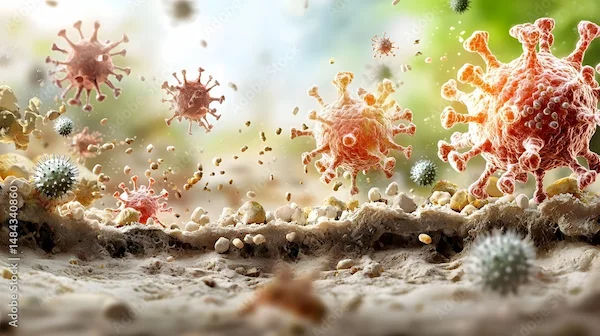Stages of Typhoid Fever Explained
Understand the stages of typhoid fever explained clearly, from initial symptoms to peak infection, complications, and recovery process.

Written by Dr. J T Hema Pratima
Reviewed by Dr. Dhankecha Mayank Dineshbhai MBBS
Last updated on 27th Jul, 2025

Typhoid fever is a serious bacterial infection caused by Salmonella typhi. It spreads through contaminated food and water and can lead to high fever, stomach pain, and weakness if left untreated. Understanding the stages of typhoid fever can help you recognise symptoms early and seek timely treatment.
In this article, we’ll explain the different stages of typhoid fever, its symptoms, causes, and how to manage it effectively.
What is Typhoid Fever?
Typhoid fever is an infection caused by the Salmonella typhi bacteria. It spreads through:
Consuming contaminated food or water
Poor sanitation and hygiene
Close contact with an infected person
If not treated properly, typhoid can lead to severe complications, including intestinal bleeding or perforation.
The 4 Stages of Typhoid Fever
Typhoid fever progresses in four stages, each lasting about a week. Recognising these stages helps in early diagnosis and treatment.
Stage 1: Early Infection (Week 1)
In the first week, symptoms are mild and may resemble a common flu. Signs include:
Gradual rise in fever (up to 103–104°F)
Headache and body aches
Fatigue and weakness
Dry cough
Loss of appetite
At this stage, many people mistake typhoid for a viral fever. If you suspect typhoid (especially after consuming contaminated food/water), consult a doctor.
Stage 2: Worsening Symptoms (Week 2)
By the second week, symptoms become more severe:
High, persistent fever
Rose-colored spots on the chest and abdomen (in some cases)
Diarrhoea or constipation
Abdominal pain and bloating
Extreme fatigue and confusion
This is when the bacteria multiply rapidly in the bloodstream, leading to more severe effects.
Stage 3: Serious Complications (Week 3)
If left untreated, typhoid can become life-threatening in the third week. Symptoms include:
Severe abdominal pain (risk of intestinal perforation)
Delirium or confusion ("typhoid state")
Extreme weight loss and dehydration
Blood in stool (due to intestinal bleeding)
Immediate medical attention is crucial at this stage to prevent fatal complications.
Stage 4: Recovery (Week 4 & Beyond)
With proper treatment (antibiotics and hydration), fever and symptoms gradually improve. However:
Weakness may persist for weeks
Some people become carriers (spreading bacteria without symptoms)
Follow-up tests are needed to ensure complete recovery
How is Typhoid Fever Diagnosed?
Doctors diagnose typhoid through:
Blood, stool, or urine tests (to detect Salmonella typhi)
Widal test (checks for antibodies, though not always reliable)
Bone marrow test (in rare, severe cases)
If you experience prolonged fever with stomach pain, consult a doctor immediately.
To Know More Consult Top Specialists
How is Typhoid Treated?
Typhoid is treated with:
Antibiotics (prescribed by a doctor)
Hydration (oral rehydration or IV fluids)
Rest and a nutritious diet
Important: Do not self-medicate, as improper antibiotic use can lead to drug-resistant typhoid.
Preventing Typhoid Fever
Prevention is the best way to avoid typhoid:
1. Vaccination
Two types of vaccines are available:
Injectable (Vi capsular polysaccharide vaccine) – Lasts 2 years
Oral (Ty21a vaccine) – Taken as capsules, lasts 5 years
Talk to your doctor about getting vaccinated, especially if travelling to high-risk areas.
2. Safe Food & Water Habits
Drink boiled or bottled water
Avoid raw vegetables, street food, and uncooked meat
Wash hands frequently with soap
3. Good Hygiene Practices
Wash hands before eating and after using the toilet
Avoid sharing utensils with an infected person
When to See a Doctor?
Seek medical help if you have:
Prolonged high fever (over 102°F)
Severe stomach pain
Blood in stool
Persistent vomiting or diarrhoea
Early treatment prevents complications and speeds up recovery.
Conclusion
Typhoid fever is a serious but treatable infection. Recognising its stages helps in early diagnosis and recovery. If you or a loved one experience persistent fever with stomach issues, consult a doctor immediately.
For expert care, you can book a consultation or lab test through Apollo 24|7 for quick and reliable diagnosis.
Consult Top Specialists
To Know More Consult Top Specialists

Dr. Shaik Abdul Kalam
General Practitioner
3 Years • MD (Physician)
Visakhapatnam
Apollo 24|7 Clinic - Andhra Pradesh, Visakhapatnam
(100+ Patients)

Dr. Dhankecha Mayank
General Practitioner
6 Years • MBBS
Gujarat
Apollo 24|7 Virtual Clinic - Gujarat, Gujarat

Dr. Md Yusuf Shareef
General Practitioner
8 Years • MBBS
Hyderabad
Apollo 24|7 Clinic, Hyderabad

Dr. Mohammed Huzef Ul Arifeen
General Practitioner
3 Years • MBBS
Hyderabad
Apollo 24|7 Clinic - Telangana, Hyderabad

Dr. Rohinipriyanka Reddy
General Practitioner
9 Years • MBBS
Hyderabad
Apollo 24|7 Clinic, Hyderabad
Consult Top Specialists

Dr. Shaik Abdul Kalam
General Practitioner
3 Years • MD (Physician)
Visakhapatnam
Apollo 24|7 Clinic - Andhra Pradesh, Visakhapatnam
(100+ Patients)

Dr. Dhankecha Mayank
General Practitioner
6 Years • MBBS
Gujarat
Apollo 24|7 Virtual Clinic - Gujarat, Gujarat

Dr. Md Yusuf Shareef
General Practitioner
8 Years • MBBS
Hyderabad
Apollo 24|7 Clinic, Hyderabad

Dr. Mohammed Huzef Ul Arifeen
General Practitioner
3 Years • MBBS
Hyderabad
Apollo 24|7 Clinic - Telangana, Hyderabad

Dr. Rohinipriyanka Reddy
General Practitioner
9 Years • MBBS
Hyderabad
Apollo 24|7 Clinic, Hyderabad




